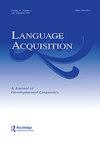On the source of children’s conjunctive interpretation of disjunction: Scope, strengthening, or both?
IF 1.3
3区 文学
0 LANGUAGE & LINGUISTICS
引用次数: 4
Abstract
ABSTRACT In a body of empirical research, it has been observed that young children from across different linguistic communities adhered to a particular type of nonadult interpretation of disjunction: They appear to interpret disjunction conjunctively. Through three experiments with Japanese-speaking preschoolers, we investigate the source of this nonadult behavior. Specifically, we ask whether children’s conjunctive interpretation of disjunction in negative sentences can be reduced to strengthening via implicature. To test this possibility, we presented Japanese children with test sentences in which the crucial disjunctive NP was located in different syntactic positions: accusative-marked object (Experiment 1), nominative-marked subject (Experiment 2), and nominative-marked object (Experiment 3). The results showed that children systematically altered their interpretations of disjunction according to its syntactic position in the test sentence. Importantly, they consistently accepted adultlike disjunctive interpretations of the test sentences in Experiments 2 and 3, but they showed adherence to the conjunctive interpretation in Experiment 1. These behaviors cannot be explained by the strengthening account, suggesting that children’s conjunctive interpretation of disjunction in negative sentences is due to their nonadult scope assignment.关于儿童对析取的连词解释的来源:范围、强化,还是两者兼而有之?
摘要在一系列实证研究中,我们观察到,来自不同语言社区的幼儿对析取有一种特殊的非成人解释:他们似乎是联合解释析取的。通过对讲日语的学龄前儿童的三个实验,我们调查了这种非成年人行为的来源。具体地说,我们询问儿童对否定句中析取的连接解释是否可以通过暗示来减少到强化。为了检验这种可能性,我们向日本儿童展示了关键析取NP位于不同句法位置的测试句:宾格标记宾语(实验1)、主格标记主语(实验2)和主格标记宾语。结果表明,儿童根据析取在测试句中的句法位置,系统地改变了对析取的解释。重要的是,在实验2和3中,他们一致接受了对测试句子的通奸式析取解释,但在实验1中,他们表现出了对连词解释的坚持。这些行为不能用强化描述来解释,这表明儿童对否定句中析取的连接解释是由于他们的非成人范围分配。
本文章由计算机程序翻译,如有差异,请以英文原文为准。
求助全文
约1分钟内获得全文
求助全文
来源期刊

Language Acquisition
Multiple-
CiteScore
2.30
自引率
8.30%
发文量
20
期刊介绍:
The research published in Language Acquisition: A Journal of Developmental Linguistics makes a clear contribution to linguistic theory by increasing our understanding of how language is acquired. The journal focuses on the acquisition of syntax, semantics, phonology, and morphology, and considers theoretical, experimental, and computational perspectives. Coverage includes solutions to the logical problem of language acquisition, as it arises for particular grammatical proposals; discussion of acquisition data relevant to current linguistic questions; and perspectives derived from theory-driven studies of second language acquisition, language-impaired speakers, and other domains of cognition.
 求助内容:
求助内容: 应助结果提醒方式:
应助结果提醒方式:


